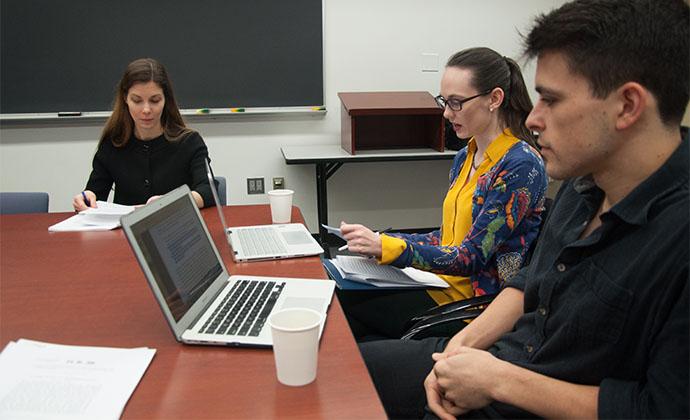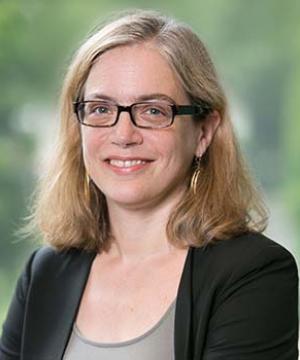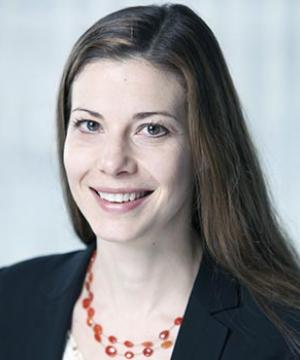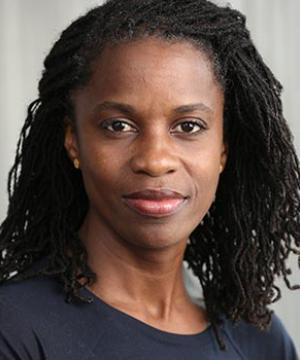Seminar Explores the Theory and Practice of American Governance
Students gain hands-on experience in battles over the powers of states and cities, led by Professors Gillian Metzger, Olatunde Johnson, and Jessica Bulman-Pozen
Yasmin Dagne ’18 remembers her first day in Columbia Law School’s Constitutional Governance Practicum as the start of four days of round-the-clock work for the American Civil Liberties Union’s Immigrants’ Rights Project. The legal team was preparing a challenge to a Texas law that requires local law enforcement to cooperate with federal immigration agents.
Dagne and five fellow students researched rulings and helped lawyers from the ACLU with a brief in the case, which is pending before the U.S. Court of Appeals for the 5th Circuit. “It was a punchy start to the semester,” recalled Dagne. “The emails and texts were flying back and forth among the students and attorneys throughout the day and night.”
As the case made its way through the courts, the students analyzed the legal issues in class — an analysis later shared with lawyers from the ACLU — with three of the Law School’s experts in constitutional law: Gillian Metzger ’96, the Stanley H. Fuld Professor of Law; Olatunde Johnson, the Jerome B. Sherman Professor of Law; and Jessica Bulman-Pozen, a professor of law at Columbia, who are faculty directors for the law school’s Center for Constitutional Governance (CCG) and teach the practicum in tandem.
Designed for second- and third-year law students, the practicum combines hands-on learning with the study of legal doctrine and theory. Students work alongside government and civil rights lawyers on projects that address current issues in American constitutional governance.
The combination of the theoretical and practical is a first of its kind for the CCG, which in recent years has offered classes that tackle such topics as political polarization and dysfunction, as well as economic inequality and the Constitution.
On the front lines of federalism
CCG received six applications for each of the 12 spots in the practicum. “We were just blown away,” said Metzger. “There’s a tremendous interest from both the students and the professors in collaborating on work that engages the pressing public law issues emerging over the last year.”
In addition to the challenge in Texas, students have researched constitutional and statutory questions about a range of issues, including state preemption of local minimum-wage ordinances; pending federal legislation that would require states to recognize other states’ concealed-carry permits for firearms; and federal agencies’ power to impose conditions on federal grants..
The opportunity to apply research, writing skills, and legal knowledge to real-world problems is “a really exciting and enriching experience,” said Sam Ferenc ’18, a student in the practicum. “I don’t think I’ve had anything else like this in law school.”
“All of the projects . . . focus largely on how much control the federal government has over policy and the extent to which the states or cities can make policies [within a framework] of federal or state law,” added Joe Margolies ’18, another student in the practicum.
In their individual research and writing, the three professors also explore such topics as the legal significance of rules that federal agencies rely on to conduct their own activities (Metzger), innovations by states and cities to address inequality (Johnson), and negotiations between the federal executive branch and the states over implementation of laws such as the Clean Air Act and Affordable Care Act (Bulman-Pozen).
The cross-pollination of ideas carries over to the students. “We’ve really seen the students be able to contribute to one another’s projects and to make connections that enrich their work for our clients,” said Bulman-Pozen.
Theory informs work . . . and vice versa
On a recent Friday morning, members of the practicum gathered around a conference table on the eighth floor of Jerome Greene Hall, where two students presented research on federal agencies’ imposition of conditions on grants to states.
Metzger and Bulman-Pozen probed the students for their assessment of the legal basis of an agency’s reasoning. One student asked the presenting team about assumptions underlying the federal law that authorized the agency to act.
“That gives you some accounting of what the interpretive norms might be,” Metzger noted in response to one point. “This is material that’s not in the administrative law casebooks.”
Dagne echoes the point. “The work has revealed that the dominant academic theories don’t fully account for the universe of possible federal and state interactions in immigration law, firearm regulation and civil rights policies,” she noted. “What’s great about the practicum is not only does theory inform our work but, with our long-term projects, the work can then inform the theory.”
Though the discussion addressed legal doctrine, the exercise transcended the academic: The group was soon joined by public sector lawyers who are facing these complex legal issues in their daily work.
“We designed the seminar to draw on areas of our interest and expertise, so we’re able to bring the knowledge that we had before the class but also develop understandings as the clients come in and we talk with them about the real challenges they’re facing,” said Johnson.
All three professors say the seminar is likely to inform their thinking about constitutional democracy and the powers of states and cities to effect social change. “The doctrine as we have it and the legal frameworks are really clashing with on-the-ground understanding of these questions,” Johnson said.
Related reading
The Center for Constitutional Governance
The Local Turn; Innovation and Diffusion in Civil Rights Law



